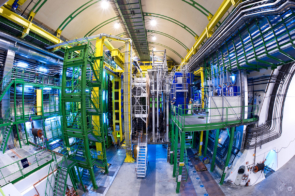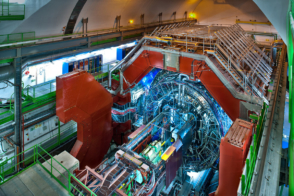The Japanese-European ASACUSA team at CERN has measured the antiproton-to-electron-mass ratio to record-breaking accuracy. The answer is 1836.153674, with an error margin of 5 in the last decimal place, which is equivalent to measuring the distance between Paris and London to within 1 mm. The corresponding ratio for the proton is 1836.15367261, so the new result shows that the mass of the antiproton is the same as that of the proton to nine significant figures (Hori 2006). This precision has been achieved using the “frequency comb” technique, development of which earned John Hall and Theodor Hänsch, the Nobel prize in 2005.
In the ASACUSA experiment, samples of antiprotonic helium – an atom with an antiproton and an electron orbiting a normal helium nucleus – were produced using CERN’s Antiproton Decelerator facility, and irradiated with a tunable laser beam, the frequency of which could be measured very precisely with the Hall-Hänsch frequency-comb technique. The laser beam could be tuned to one of several characteristic frequencies of the antiprotonic atoms, each frequency corresponding to an atomic transition of the antiproton. Since these frequencies were determined by the properties of the antiproton, the ratio of the antiproton mass to the electron mass could then be calculated from the measured values.
The results can also be combined with an earlier high-precision measurement of the antiproton’s cyclotron frequency (which determines the curvature of its path in a magnetic field). This shows that there is no difference in the proton and antiproton charges either, apart from the sign. Still more precise experiments are planned with the optical comb, and may soon give an even smaller margin of error for the antiproton than the best one obtained for the proton itself (currently about five times smaller). Surprisingly, the antiproton may soon be known better than the proton.
Further reading
M Hori et al. 2006. Phys. Rev. Lett. 96 243401.





